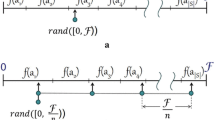Abstract
We propose and investigate a new concept for automatic search for attack strategies and demonstrate its use in the area of wireless sensor networks. We exploit mechanisms inspired by the biological evolution, known as Evolutionary Algorithms and we use a combination of simulation (or real system execution) with a candidate attacks generator. Each candidate is evaluated, its success is measured and used as a guiding input for the next generation of candidates. Evolutionary Algorithms perform well in case they evaluate a large number of candidate attack strategies, and thus we have focused on applications where quality can be assessed fast (in order of seconds and optimally less).
Access this chapter
Tax calculation will be finalised at checkout
Purchases are for personal use only
Preview
Unable to display preview. Download preview PDF.
Similar content being viewed by others
References
Anderson, R., Chan, H., Perrig, A.: Key infection: Smart trust for smart dust. In: Proceedings of the 12th IEEE International Conference on Network Protocols, ICNP 2004, pp. 206–215. IEEE Computer Society, Washington, DC (2004)
Blum, B., He, T., Son, S., Stankovic, J.: IGF: A state-free robust communication protocol for wireless sensor networks. Technical Report, CS-2003-11. Department of Computer Science, University of Virginia, USA (2003)
Chan, H., Perrig, A., Song, D.: Random key predistribution schemes for sensor networks. In: Proceedings of the 2003 IEEE Symposium on Security and Privacy, SP 2003, pp. 197–214. IEEE Computer Society, Washington, DC (2003)
Chan, H., Perrig, A., Song, D.: Key distribution techniques for sensor networks, pp. 277–303 (2004)
Cvrcek, D., Svenda, P.: Smart dust security - key infection revisited. In: Security and Trust Management 2005, Italy. ENTCS, pp. 10–23 (2005)
Du, W., Deng, J., Han, Y.S., Varshney, P.K.: A pairwise key pre-distribution for wireless sensor networks. In: Proceedings of the 10th ACM Conference on Computer and Communications Security, CCS 2003, Washington, DC, USA, pp. 42–51 (2003)
Eschenauer, L., Gligor, V.D.: A key-management scheme for distributed sensor networks. In: Proceedings of the 9th ACM Conference on Computer and Communications Security, CCS 2002, Washington, DC, USA, pp. 41–47 (2002)
Fogla, P., Lee, W.: Evading network anomaly detection systems: formal reasoning and practical techniques. In: CCS 2006: Proceedings of the 13th ACM Conference on Computer and Communications Security, pp. 59–68. ACM, New York (2006)
Lee, J.-K., Lee, M.-W., Lee, J.-S., Chi, S.-D., Ohn, S.-Y.: Automated Cyber-attack Scenario Generation Using the Symbolic Simulation. In: Kim, T.G. (ed.) AIS 2004. LNCS (LNAI), vol. 3397, pp. 380–389. Springer, Heidelberg (2005)
Liu, D., Ning, P.: Establishing pairwise keys in distributed sensor networks. In: CCS 2003: Proceedings of the 10th ACM Conference on Computer and Communications Security, pp. 52–61. ACM Press, New York (2003)
Meadows, C.: Formal methods for cryptographic protocol analysis: emerging issues and trends. IEEE Journal on Selected Areas in Communications 21(1), 44–54 (2003)
Massicotte, F., Gagnon, F., Labiche, Y., Briand, L., Couture, M.: Automatic evaluation of intrusion detection systems. In: ACSAC 2006: Proceedings of the 22nd Annual Computer Security Applications Conference, pp. 361–370. IEEE Computer Society, Washington, DC (2006)
Di Pietro, R., Mancini, L.V., Mei, A.: Random key-assignment for secure wireless sensor networks. In: 1st ACM Workshop Security of Ad Hoc and Sensor Networks, Fairfax, Virginia, pp. 62–71 (2003)
Rubin, S., Jha, S., Miller, B.P.: Automatic generation and analysis of nids attacks. In: ACSAC 2004: Proceedings of the 20th Annual Computer Security Applications Conference, pp. 28–38. IEEE Computer Society, Washington, DC (2004)
Sheyner, O., Haines, J., Jha, S., Lippmann, R., Wing, J.M.: Automated generation and analysis of attack graphs. In: SP 2002: Proceedings of the 2002 IEEE Symposium on Security and Privacy, p. 273. IEEE Computer Society, Washington, DC (2002)
Svenda, P., Matyas, V.: Authenticated key exchange with group support for wireless sensor networks. In: WSNS 2007: Proceedings of the 3rd Wireless and Sensor Network Security Workshop, pp. 21–26. IEEE Computer Society Press, Los Alamitos (2007)
Svenda, P., Matyas, V.: Key distribution and secrecy amplification in wireless sensor networks. Technical Report, FIMU-RS-2007-05, Brno, ČR, Masaryk University (2007)
Thompson, A.: Hardware Evolution: Automatic design of electronic circuits in reconfigurable hardware by artificial evolution. Distinguished dissertation series. Springer (1998)
Švenda, P., Sekanina, L., Matyáš, V.: Evolutionary design of secrecy amplification protocols. In: ACM WiSec 2009, Zurich, Switzerland (2009)
Ye, F., Chen, A., Liu, S., Zhang, L.: A scalable solution to minimum cost forwarding in large sensor networks. In: Proceedings of Tenth International Conference on Computer Communications and Networks, pp. 304–309 (2001)
Author information
Authors and Affiliations
Editor information
Editors and Affiliations
Rights and permissions
Copyright information
© 2013 Springer-Verlag Berlin Heidelberg
About this paper
Cite this paper
Kůr, J., Matyáš, V., Švenda, P. (2013). Evolutionary Design of Attack Strategies. In: Christianson, B., Malcolm, J.A., Matyáš, V., Roe, M. (eds) Security Protocols XVII. Security Protocols 2009. Lecture Notes in Computer Science, vol 7028. Springer, Berlin, Heidelberg. https://doi.org/10.1007/978-3-642-36213-2_2
Download citation
DOI: https://doi.org/10.1007/978-3-642-36213-2_2
Publisher Name: Springer, Berlin, Heidelberg
Print ISBN: 978-3-642-36212-5
Online ISBN: 978-3-642-36213-2
eBook Packages: Computer ScienceComputer Science (R0)




